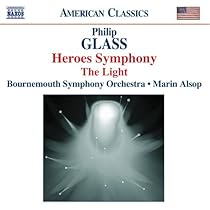Glass: Heroes Symphony; The Light
Product Details
Editorial Reviews
Amazon.com
Heroes was composed in 1996 as a set of ballet pieces for Twyla Tharp; each of the six movements was based on tunes by David Bowie and Brian Eno. Even outside of their obvious dance purposes, listeners will have plenty to keep them interested, since Glass's scoring for these pieces is colorful and ear-catching. Horns play a big part in the opening section; "Abdulmajid," has an Arabic tinge, featuring castanets and celesta; the heavy brass that opens "Sense of Doubt" gives way to some fine woodwind play, and so forth. Much of the work is in the familiar Glass style of repeated arpeggiated phrases, but the textures change constantly. The Light, from 1987, is supposedly a depiction of a scientific experiment confirming the speed of light, but the listener need not be concerned. It starts with a lovely if downhearted theme but picks up steam in a manner that may remind you of the composer's The Photographer, eventually reaching an almost tipsy level of frenzy. The performances by Marin Alsop and The Bournemouth Symphony Orchestra are ideal. --Robert Levine
Customer Reviews
Good, but not the most innovative to come from Glass![]()
I am not ashamed to say that I am a Philip Glass (b. 1936) fan and am usually quick to pick up new recordings of his works. When Glass is at his most inventive, his music has an irresistible momentum and is highly inventive, defying expectations given the limited amount of harmonic and melodic material employed. With that said, I think the two pieces contained on the present release, while good, are not among Glass' most interesting works.
The Light is a 24-minute orchestral work dating from 1987, supposedly influenced by a scientific experiment supporting that the speed of light is uniform. Overall, the piece is far more interesting than the physics theories on which it is based, but the limited musical material does not support its extended length. Glass' fingerprints are readily apparent here, with endless arpeggiations, three versus two contrasts, and (of course) the "Da daah da Da daah da" rhythmic motif with which the followers of Glass are surely familiar. So, in this regard, the previous reviewer is correct - if you own other Glass discs, you, more or less, have heard a better constructed version of this composition before.
I find Glass' Symphony No. 4, dating from 1996, to be a bit more intriguing. The symphony is known as the "Heroes Symphony" as the underlying musical material was taken from David Bowie's "Heroes" album - but I suspect most "classical" listeners will be unable to differentiate this work from Glass' non-rock inspired compositions. The six movements of this work (each one named after a song on the "Heroes" album) can be viewed independently or as part of a "self-sufficient musical work" - as the program notes phrase it. For me, I think the symphony works better when each movement is viewed independently. In my opinion, there are two fantastic movements within the symphony: (1) the "Heroes" movement, which gradually builds in intensity through the fascinating incorporation of dissonances, while maintaining the joyful mood established at the outset of the movement; and (2) the "Sense of Doubt" movement (those familiar with the original album will surely recognize the ominous descending figure here) which contains several tasty melancholy harmonic twists. The other four movements hold the listeners attention through their colorful orchestration (ex: pitched percussion, castanets, etc.) and rhythmic momentum, but, in my opinion, pale in comparison to the two movements I specifically mentioned above.
If you like Glass' style you will like this release; especially the symphony. Overall, I think this release is somewhere between four and five stars. I am rounding down in this case to differentiate this disc from other recent Glass releases which I absolutely loved; namely the recording of Glass' concertos by the Orange Mountain label (Philip Glass: The Concerto Project, Vol. 1, Philip Glass: The Concerto Project, Vol. 2). Although, I admit, this is a little unfair to Glass, as I am comparing his more recent, and evolved, compositions, to his previous ones, but I think others may agree.
So, in conclusion, if you are looking for something you have not heard from Glass before, you may be somewhat disappointed with this release. But, if you have already acquired Glass' concertos and are looking to fill a gap in your Glass symphony cycle, you should acquire this disc.
Recommended.
TT: 70:09
Don't waste your money![]()
I have many Phillip Glass CDs and this one was just a rehash of others.
Glass energy is ordered and breathing![]()
Heroes Symphony and The Light are written and performed with all that I have appreciated of Glass' music since I first heard the Philip Glass Ensemble in 1971. As with Handel, for example, parts of the symphonies are "taken from" previous works. These compositional liberties are not self-quoting, although they might be part of what a composer does to achieve an enormous life opus. They are welcome moments, such as when I am transported to a live performance of The Photographer in the midst of these much newer works.
I love this music and thank Glass and his collegues for it.
Related Links : Product by Amazon or shopping-lifestyle-20 Store

ไม่มีความคิดเห็น:
แสดงความคิดเห็น